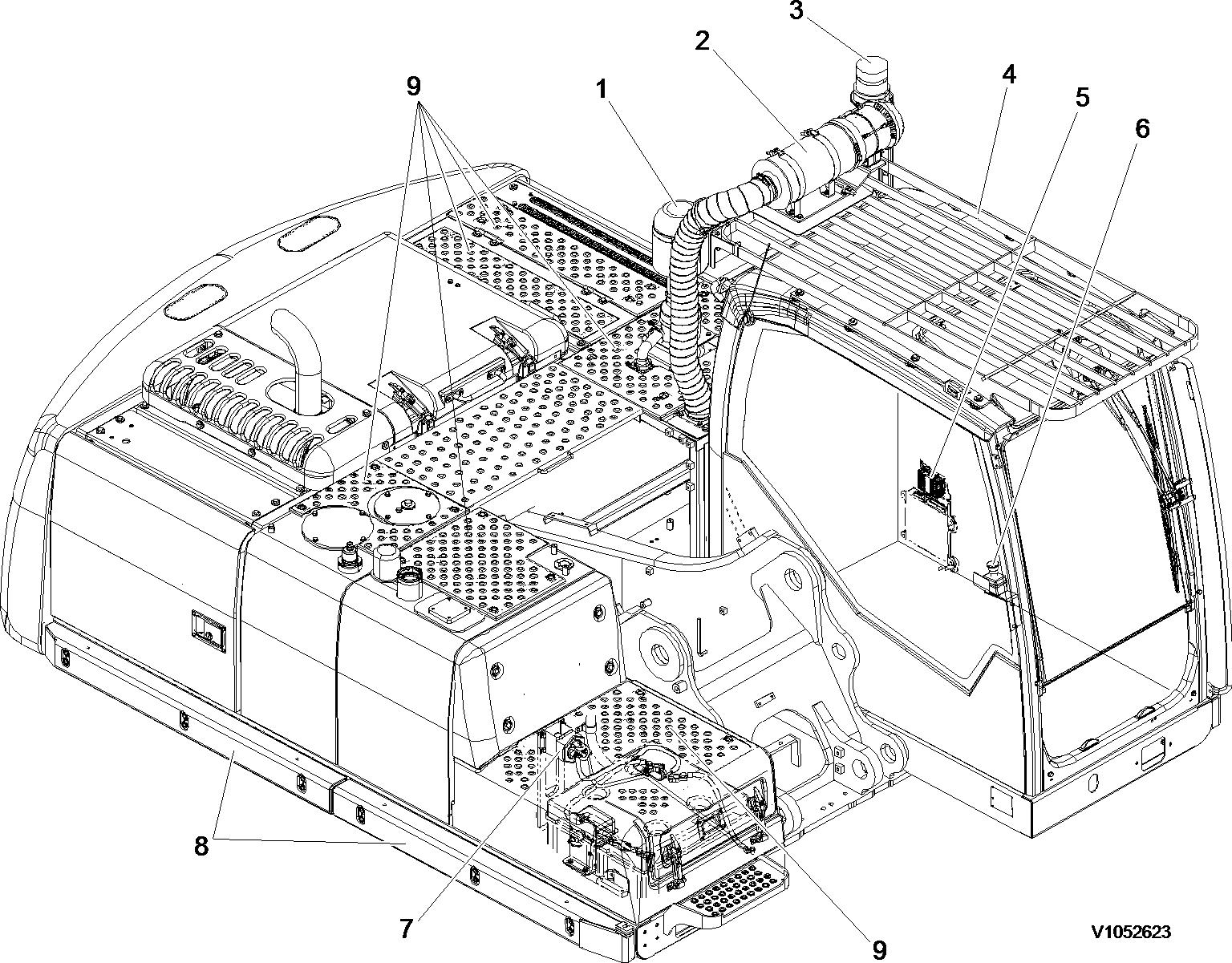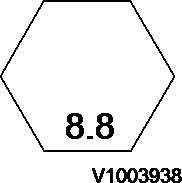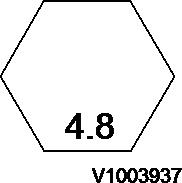Document Title:

Product plates
Profile:
Function Group: 000
EXC, EC210C L, EC160C L, EC180C L [GB]
Product plates
Information Type: Service Information

Document Title:

Product plates
Profile:
Function Group: 000
EXC, EC210C L, EC160C L, EC180C L [GB]
Information Type: Service Information
Date: 2014/11/4
When ordering spare parts, and in all telephone enquiries or correspondence the model designation and the Product Identification Number (PIN) must always be quoted.

Product plate
The product plate on the machine shows the manufacturer's name and address, model designation, PIN, machine weight, engine output, production year and year of delivery. There is also room for the CE mark. The plate is positioned under the boom on the superstructure frame.
Engine
The engine product plate contains type designation and part and serial numbers and is positioned on the engine inside the rear engine cover on the right side of the machine.
Attachment quick coupler
The attachment quick coupler nameplate is attached on the outside of the attachment quick coupler. (shows part number and weight)
Bucket
The bucket nameplate is attached on the top of the bucket. (shows the bucket model order No, Serial number, bucket part number, rated capacity, weight, cutting width, tooth part number and adapted part number)
Cab
The nameplate is attached on the inside of the cab and indicates the product number, serial number, model type, and weight.
Document Title: Machine view, waste handler



Profile: EXC, EC210C L [GB]
Function Group: 000
Information Type: Service Information
Date: 2014/11/4
Waste handling machines have a variety of configurations to meet waste handling application needs. Specially, the machines are reinforced Dual stage pre-cleaner, Cab air filtering system, Emergency stop switch, Cab riser, Fire extinguisher system and Bucket cylinder guard to fulfill an excellent performance in waste handling application.
Figure 1 Components position on machine 1. Dual stage pre-cleaner 2. Cab air filtering system 3. Emergency stop switch 4. Cab riser: 1200 mm (47.2 in) 5. Fire extinguisher system

Document Title: Machine view, waste handler


Profile: EXC, EC210C L [GB]
Function Group: 000 Information Type: Service Information
Date: 2014/11/4


The following charts give the standard tightening torques of screws and nuts. Exceptions are given in each sections of “disassembly and assembly”.



NOTE!
This torque table does not apply to screws with nylon packings or where nonferrous metal washers are to be used, or which require tightening to a different specified torque, or tightening procedure.
NOTE!
N m (Newton meter):1 N m ≅ 0.1 kgf m
Tightening torque of split flange screws
Use these torques for split flange screws.
Tightening torque (split flange screws)
Tightening torque for hydraulic plugs with O-ring
Tightening torque (hydraulic
Tightening torque for swivel nut fitting with O-ring
Tightening torque for swivel

 Figure 1
Hydraulic plugs with O-ring
1. O-ring
2. Plug
Pf thread
Figure 1
Hydraulic plugs with O-ring
1. O-ring
2. Plug
Pf thread
Document Title: NET 8940-00200 Replace tool for the remote control valve joint


Profile: EXC, EC210C L [GB]
Function Group: 080
Information Type: Service Information Date: 2014/11/4
NET 8940-00200 Replace tool for the remote control valve joint
Replace tool for the remote control valve joint
Document Title:
E-tools, NET 8940-00270

Replace tool for the swing ring gear
Profile:
EXC, EC210C L [GB]
Function Group: 080
Information Type: Service Information Date: 2014/11/4
E-tools, NET 8940-00270 Replace tool for the swing ring gear
Replace tool for the swing ring gear

Document Title:

E-tools, NET 8940-00300 Swing ring gear guide pin
Profile:
EXC, EC210C L [GB]
Function Group: 080
Information Type: Service Information
E-tools, NET 8940-00300 Swing ring gear guide pin

Date: 2014/11/4
Figure 1Document Title: NET 8940-00290 Track motor guide pin


Profile: EXC, EC210C L [GB]
Function Group: 080
Information Type: Service Information Date: 2014/11/4
NET 8940-00290 Track motor guide pin
Track motor guide pin
Figure 1Document Title: Service positions
Profile: EXC, EC210C L [GB]
Function Group: 091
Information Type: Service Information
Date: 2014/11/4
Park the machine on a horizontal and firm surface. The suitable position is indicated in the description for the various service jobs.




 Figure 1 Service position A
Figure 2 Service position B
Figure 3 Service position C
Figure 4 Service position D
Figure 1 Service position A
Figure 2 Service position B
Figure 3 Service position C
Figure 4 Service position D

 Figure 5
Service position E
Figure 6
Service position F
Figure 5
Service position E
Figure 6
Service position F
Document Title:
Welding on the machine
Profile:
Function Group: 091
EXC, EC210C L, EC160C L, EC180C L [GB]
Information Type: Service Information
Date: 2014/11/4
During electric welding on the machine or attachments connected to the machine, components such as bearings and electric units may be damaged if the ground cable is connected incorrectly.
The following actions should be taken before starting electric welding to eliminate these risks:

1. Turn off the electric power using the battery disconnector.
2. Disconnect the batteries.
NOTE!
Both the plus and minus terminal.
3. Disconnect the following electronic units:
– Vehicle electronic control unit (V-ECU)
– Engine electronic control unit (E-ECU)
– Instrument electronic control unit (I-ECU)
Electronic climate control unit (ECC)
– Wiper control unit (CU3601)
4. Connect the welding unit's ground connection as close as possible to the welding point, and make sure that the current does not pass across a bearing.
If welding is necessary on the boom or dipper arm, the following basic rules should be followed:
1. Welding beads should be laid down in the longitudinal direction.
2. If possible, weld in the middle of the metal section and never closer than 80 mm to an edge.
3. Do not weld near the welded connections of the cylinder mounting eyes. Minimum distance from eye's weld to weld for weld lug = 100 mm
4. Do not weld close to where a metal plate has been bent.
Document Title: Hydraulic cylinders, dieseling
Profile:
Function Group: 091
EXC, EC210C L, EC160C L, EC180C L [GB]
Information Type: Service Information
Date: 2014/11/4
If air enters the hydraulic cylinders during work on the hydraulic system, this can lead to spontaneous ignition, an effect known as dieseling. This occurs if a favourable mixture of air and hydraulic oil is compressed when the piston approaches its end position in the cylinder. A sufficiently high temperature can be reached for the mixture to spontaneously ignite.
The dieseling effect may result in burnt piston seals and bushings.
In order to prevent dieseling, the lines for the hydraulic cylinders must be bled after work is completed, as follows:
Operate the digging equipment several times with no load and full cylinder strokes.
Position the dipper arm and bucket cylinders so that any air collects at the cylinder's outlet side, that is, it should be the highest point. The piston should be at the opposite end of the cylinder. Wait approx. 1 minute from the time that the cylinder has reached its position before running the piston towards the outlet side. Repeat 3 to 5 times.
The boom cylinders, which cannot be pointed downward, must be run in and out approx. 5 times without bucket load.

If the cylinders are pressurized either through lifting of the machine or lifting of a load in the bucket, without first performing the mentioned bleeding movements, the seals will likely be damaged.
If a cylinder is to be pressure-tested after a repair, the piston rod should be run in and out a few times before increasing the pressure to testing pressure.
Document Title: Control units, changing
Profile:
Function Group: 091
EXC, EC210C L, EC160C L, EC180C L [GB]
Information Type: Service Information
Date: 2014/11/4
Before changing electronic control unit Volvo CE product specialist should be consulted.

NOTE!
Before changing a control unit, customer parameters must be read out so that they can be programmed again.
Thank you for your purchase. Have a nice day. file:///C|/Users/app/Documents/yeqiwen-END.txt[2014/11/4